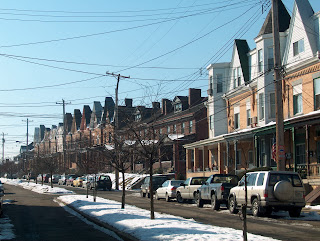
Universities are known for their primarily indifferent approach to historic preservation, often favoring a pragmatic development approach based on efficiency and institutional survival.
One need only look to the University of Pittsburgh’s policies in Oakland as a case and point. Examples include: the demolition of Forbes Field, one of Pittsburgh’s greatest cultural resources, to build the domineering Wesley W. Posvar Hall in 1971, to the destruction of the Syria Mosque in 1991 to build a parking lot, and the more recent example of the expansion of Bouquet Gardens and the resulting demolition of one of Oakland’s oldest residences in 2010.
However, the discouraging policy decisions made by the universities need not inhibit students from participating in preservation.
To promote preservation in Pittsburgh students can apply to become an intern for course credit or a volunteer for local non-profits like the Young Preservationists Association. Additionally, local universities offer Certificates in Historic Preservation or Preservation Majors (see links at the bottom of the page). Perhaps most important is education of the public on the importance of preservation and the role it can play in fostering community identity, conservation, and redevelopment. Student organizations can help spread awareness of the preservation cause around campus.
YPA has the potential to fill this role at local colleges and universities through a chapter network with one group at each school. Student interns or volunteers could run each chapter from YPA. Individual chapters could hold events on campus and get together with other chapters for YPA’s big events like the Preservation Summit.
Often, when asked about my major the question I get is, “What is historic preservation?” I would love to see that question change to “How can I get involved?” As an Architectural Studies (Historic Preservation Track) and Urban Studies student at the University of Pittsburgh, I recognize that major improvements have been made to the Historic Preservation program in the past few years, including the addition of a Historic Preservation Major. But, the University of Pittsburgh currently has no extracurricular student group or club devoted specifically to historic preservation.
I would like to see a new club or group devoted to preservation that could help connect students to preservation opportunities and raise awareness of preservation on campus and the city as a whole (perhaps a group that works with YPA). Moreover, I would like to see more hands on involvement and first-hand experience in my program. Visiting sites, preparing nominations, and perhaps specific preservation labs could be ultimately beneficial for students and help prepare them for graduate school or professional work in the field.
Links:
Pittsburgh History and Landmarks Foundation:
http://www.phlf.org/
University of Pittsburgh Architectural Studies Program:
http://www.arch.pitt.edu/
University of Pittsburgh Historic Preservation Certificate:
http://www.oafa.pitt.edu/pdf/infosheets/CERT_HISTORIC_PRESERVATION.pdf
Lee Riccetti, Pitt Student and YPA Intern, March 4, 2011

